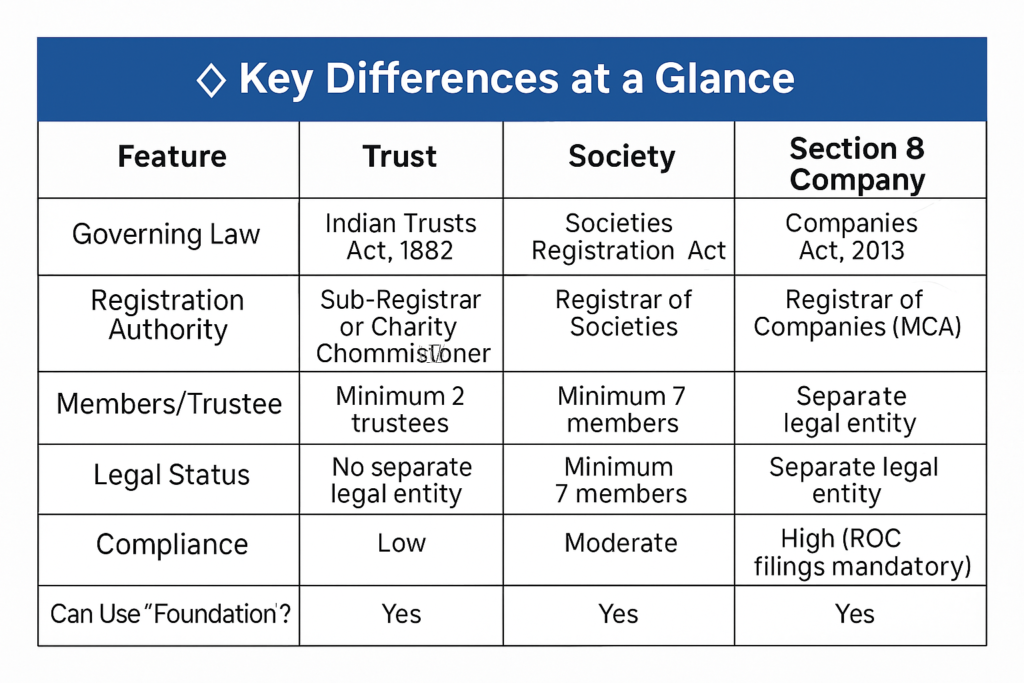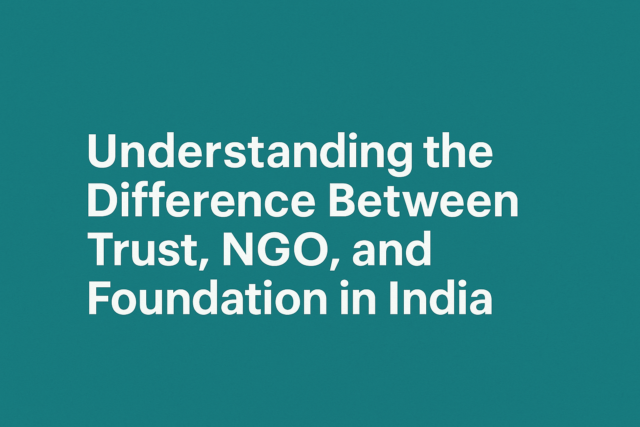New Delhi, Aprail 6: In India, the terms Trust, NGO, and Foundation are often used interchangeably, leading to confusion. While all of them work toward social welfare, there are key differences in their structure, legal framework, and operational scope. Here’s a breakdown to understand what sets them apart.
 1. NGO (Non-Governmental Organization) – A Broad Umbrella Term
1. NGO (Non-Governmental Organization) – A Broad Umbrella Term
NGO is not a legal entity in itself but a generic term used to describe organizations that work for non-profit, social welfare, or charitable purposes.
An NGO in India can be legally registered as one of the following:
-
A Trust (under the Indian Trusts Act, 1882)
-
A Society (under the Societies Registration Act, 1860)
-
A Section 8 Company (under the Companies Act, 2013)
NGO = Category, not a structure. So a Trust, Society, or Foundation can all be called NGOs if they operate for non-profit causes.
 2. Trust – Oldest and Simplest Charitable Form
2. Trust – Oldest and Simplest Charitable Form
A Trust is created when the owner of a property or asset (the settlor) transfers it to a trustee, with an obligation to use it for a charitable purpose.
 Key Features:
Key Features:
-
Governed by Indian Trusts Act, 1882 (for private trusts) or public trust acts in states like Maharashtra and Gujarat.
-
No shareholders or members; run by trustees.
-
Minimum of 2 trustees (in most states).
-
No regular elections required.
-
Relatively easy to register and manage.
-
Ideal for family-run or community-based charitable institutions.
 3. Foundation – A Type of NGO, Often as Trust or Section 8 Company
3. Foundation – A Type of NGO, Often as Trust or Section 8 Company
A Foundation is not a distinct legal structure in Indian law. It is usually a Trust or a Section 8 Company registered under another legal framework, but branded or named as a “Foundation” for visibility, branding, or philanthropic positioning.
 Common Types of Foundations:
Common Types of Foundations:
-
Corporate Foundations – CSR arms of businesses (e.g., Reliance Foundation, Tata Trusts).
-
Usually registered as:
-
A Public Charitable Trust, or
-
A Section 8 Company
-
So, a Foundation = Trust/Society/Section 8 Company that operates under a defined charitable vision, usually with long-term funding.
 4. Key Differences at a Glance
4. Key Differences at a Glance

 5. Which One Should You Choose?
5. Which One Should You Choose?
-
For a simple charitable effort like building schools or helping the needy with minimal legal hassle: go for a Trust.
-
For a collaborative or membership-based NGO with democratic structure: a Society is better.
-
For a CSR-backed, corporate-style or scalable non-profit with legal credibility: choose a Section 8 Company.
 Conclusion
Conclusion
Whether you’re starting a Trust, NGO, or Foundation, your choice should align with:
-
Your governance style
-
The scale of your operations
-
Funding plans (domestic or foreign)
-
And your long-term impact goals
All three forms are valid and widely used in India, but understanding their legal and operational nuances helps create a stronger, more accountable organization for social change.

